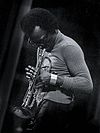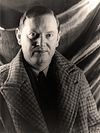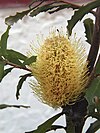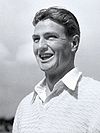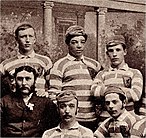Wikipedia:Today's featured article/November 2016
| << | Today's featured articles for November 2016 | >> | ||||
|---|---|---|---|---|---|---|
| Su | Mo | Tu | We | Th | Fr | Sa |
| 1 | 2 | 3 | 4 | 5 | ||
| 6 | 7 | 8 | 9 | 10 | 11 | 12 |
| 13 | 14 | 15 | 16 | 17 | 18 | 19 |
| 20 | 21 | 22 | 23 | 24 | 25 | 26 |
| 27 | 28 | 29 | 30 | |||
November 1
James Rowland (1 November 1922 – 27 May 1999) was a senior commander in the Royal Australian Air Force (RAAF), serving as Chief of the Air Staff (CAS) from 1975 to 1979. He later held office as Governor of New South Wales from 1981 to 1989, and was Chancellor of the University of Sydney from 1990 to 1991. After joining the RAAF in 1942, he was posted to Britain as a Pathfinder bomber pilot in the air war over Europe, earning the Distinguished Flying Cross. He was forced to bail out over Germany following a collision with another Allied aircraft in 1945, and was imprisoned. After repatriation and demobilisation, Rowland finished an aeronautical engineering degree and rejoined the RAAF. He became a test pilot, serving with and later commanding the Aircraft Research and Development Unit in the 1950s, and also a senior engineering officer, being closely involved in the delivery to Australia of the Dassault Mirage III supersonic fighter in the 1960s. He served as Air Member for Technical Services from 1972 until 1975, when he was elevated to air marshal and CAS, the first engineer to hold the position. He was knighted in 1977 and appointed a Companion of the Order of Australia in 1987. (Full article...)
November 2
Mayflies are an order (Ephemeroptera) of over 3,000 species of flying insects, related to dragonflies and damselflies. They are relatively primitive, with ancestral traits that were probably present in the first flying insects, such as long tails, and wings that do not fold flat over the abdomen. Their immature stages (nymphs) live in fresh water. Unique among insect orders, they have a fully winged adult stage that moults into a sexually mature adult. Often, all the mayflies in a population mature at the same time, emerging in the spring, summer or autumn in enormous numbers; some hatchings attract tourists. Mayflies are a favourite food of many fish, and fishing flies are often modelled to resemble them. The brief lives of mayfly adults—less than five minutes for the female Dolania americana, after the final moult—have been noted by naturalists and encyclopaedists since Aristotle and Pliny the Elder. The English poet George Crabbe compared a daily newspaper's lifespan to that of a mayfly in the satirical poem "The Newspaper" (1785). (Full article...)
November 3
William McKinley's campaign for US president was successful, defeating William Jennings Bryan, who was both the Democratic and Populist nominee, on November 3, 1896. McKinley, a former Governor of Ohio, refused to deal with eastern bosses such as Thomas Platt and Matthew Quay, who supported favorite son candidates to run against him for the Republican nomination. The large, efficient McKinley organization, run by his friend and political manager Mark Hanna, swept him to a first ballot victory at the 1896 Republican National Convention, with New Jersey's Garret Hobart as his running mate. McKinley intended to run mainly as a protectionist, but free silver became the issue of the day. After Bryan captured the Democratic nomination as a foe of the gold standard, Hanna raised and spent millions to convince voters that free silver would be harmful. McKinley stayed at home in Canton, Ohio, running a front porch campaign that reached millions through press coverage of his speeches, while Bryan toured the nation by rail. McKinley forged an electoral coalition of the well-to-do, urban dwellers, and prosperous farmers that kept the Republicans in power most of the time until 1932. (Full article...)
November 4
Agharta is a live double album by American jazz musician Miles Davis (pictured) and his septet. Titled after the legendary subterranean city, it was recorded at a concert in Japan's Osaka Festival Hall in February 1975. Saxophonist Sonny Fortune, bassist Michael Henderson, and guitarist Pete Cosey improvised against a dense backdrop of riffs, electronic effects, cross-beats, and funk grooves from the rhythm section. Davis had already alienated many in the jazz community while attracting younger rock audiences with his radical electric fusion music. This dark, angry, and somber performance was seen as a reflection of his emotional and spiritual state—he was in physical pain from health issues and a substance abuse problem, and had been touring constantly with his band since 1973. The album was released in Japan in August 1975 by CBS/Sony, and in North America in 1976 by Columbia Records. A highly divisive record, it further challenged Davis' jazz audience and critics. It was reevaluated positively after a generation of younger musicians was influenced by the group's abrasive music and Cosey's effects-laden free improvisations, and is seen as the culmination of Davis' electric period. (Full article...)
November 5
Robert Catesby (1572?–1605) was the leader of the failed Gunpowder Plot of 1605, commemorated in Great Britain every 5 November as Guy Fawkes Night. His family were prominent recusant Catholics. He took part in the Essex Rebellion of 1601 but was captured and assessed a large fine, after which he sold his estate at Chastleton. The Protestant James I became King of England in 1603; after he exiled priests and reimposed fines on recusants, Catesby planned to kill him by blowing up the House of Lords with gunpowder as a prelude to a revolt. Early in 1604 Catesby began to recruit English Catholics to his cause, including Thomas Wintour, John Wright, Thomas Percy, and Guy Fawkes. A letter sent anonymously to William Parker, 4th Baron Monteagle, alerted the authorities, and on the eve of the planned explosion, during a search of Parliament, Fawkes was found guarding the barrels of gunpowder, and arrested. Catesby and the remaining plotters made a stand against a 200-strong company of armed men at Holbeche House in Staffordshire, where he was shot and killed. As a warning to others, his body was exhumed and his head exhibited outside Parliament. (Full article...)
Part of the Gunpowder Plot featured topic.
November 6
Emma Stone (born November 6, 1988) is an American actress. She has won two Screen Actors Guild Awards and has been nominated for an Academy Award, two British Academy Film Awards, and two Golden Globe Awards. Born and raised in Scottsdale, Arizona, Stone was drawn to acting as a child, and her first role onstage was in 2000. As a teenager, she relocated to Los Angeles with her mother, and made her film debut in Superbad (2007). The 2010 teen comedy Easy A, Stone's first starring role, earned her nominations for the BAFTA Rising Star Award and for a Golden Globe Award for Best Actress. This breakthrough role was followed by the commercially successful film Crazy, Stupid, Love (2011), and a supporting part in the critically acclaimed drama The Help (2011). The actress received wider recognition for playing Gwen Stacy in the 2012 superhero film The Amazing Spider-Man, and its sequel in 2014. She was nominated for an Academy Award for Best Supporting Actress for the role of a recovering drug addict in the black comedy Birdman (2014). Stone won the Volpi Cup for Best Actress for playing an aspiring actress in the musical La La Land (2016). (Full article...)
November 7
"From The Doctor to my son Thomas" is a viral video recorded by the Scottish actor Peter Capaldi (pictured) and sent to Thomas Goodall, an autistic nine-year-old who was grieving over the death of his grandmother. Thomas's father Ross posted the video to YouTube on 6 November 2014 so that his whole family could see it, but the video had wide appeal, and was viewed more than 200,000 times over the next 48 hours. Less than a week later it had over 900,000 views. In the video Capaldi portrays his character, the Twelfth Doctor, from the BBC science-fiction series Doctor Who. His message had a positive effect on Thomas; the father said the boy smiled for the first time since learning of his grandmother's death, and gained the courage to go to her funeral. The video was praised as a deeply affecting piece in The Guardian, The Daily Telegraph, The Independent, Hollywood Life, and various Spanish and Dutch publications, and by CNN and MTV News. It also had a positive impact on many viewers who suffered from autism and other mental health problems. (Full article...)
November 8
HMS Collingwood was a St Vincent-class dreadnought battleship built for the British Royal Navy in the first decade of the 20th century. Launched on 7 November 1908 and commissioned in April 1910, the ship was equipped with armour 10 inches (254 mm) thick, and ten 12-inch guns. She served in the Home Fleet and Grand Fleet, at times as the flagship of Rear-Admiral Ernest Gaunt. Prince Albert (later King George VI) spent several years aboard the ship before and during World War I. At the Battle of Jutland in 1916, the largest naval battle of the war, Collingwood was in the middle of the battleline; she did some damage to the German battlecruiser SMS Derfflinger, and shelled the light cruiser SMS Wiesbaden. Apart from that battle and the inconclusive Action of 19 August, her service during the war generally consisted of routine patrols and training in the North Sea. The ship was deemed obsolete after the war, reduced to reserve, and used as a training ship before being sold for scrap in 1922. (Full article...)
November 9
William Howard Taft (1857–1930) was the 27th President of the United States (1909–1913) and the 10th Chief Justice of the United States (1921–1930), the only person to have held both offices. Taft initially served as a state and federal judge, and as governor of the Philippines beginning in 1900. In 1904 Theodore Roosevelt made him Secretary of War. Taft declined repeated offers to become a Supreme Court justice. He was Roosevelt's hand-picked successor in 1908, and easily defeated William Jennings Bryan for the presidency. In the White House, he focused on the Far East more than Europe, and repeatedly intervened in Latin America. Taft was allied with the conservative wing of the Republican Party, while Roosevelt became more liberal after 1909. Roosevelt unsuccessfully challenged Taft for renomination in 1912, then bolted the party and ran as a third-party candidate. The split in the Republican vote left Taft with little chance of re-election, and he lost to Woodrow Wilson, winning only Utah and Vermont. In 1921 Taft was appointed Chief Justice, and served until a month before his death. He compiled a conservative record, and reformed the court's administration. (Full article...)
November 10
Millipedes are a class (Diplopoda) of arthropods, characterised by two pairs of jointed legs on most body segments. Most species have long cylindrical or flattened bodies with more than 20 segments, while pill millipedes are shorter and can roll into a ball. There are around 12,000 named species, making Diplopoda the largest class of myriapods. Despite their name (from the Latin for "thousand feet"), no known species has 1,000 legs; the most recorded is 750. Most species are detritivores, eating decaying leaves and other dead plant matter. Millipedes are generally harmless to humans, although some can become household or garden pests. Most defend themselves with a variety of chemicals secreted from pores along the body, except for the tiny bristle millipedes, which are covered with tufts of detachable bristles. First appearing in the Silurian period, millipedes are some of the oldest known land animals. While the largest modern species can reach lengths of 38 cm (15 in), some prehistoric millipedes grew to over 2 m (6 ft 7 in). (Full article...)
November 11
George S. Patton (November 11, 1885 – December 21, 1945) was a general who commanded the U.S. Seventh and Third armies during World War II. He had been wounded during World War I leading the newly formed Tank Corps of the American Expeditionary Forces into combat. In 1942 he led U.S. troops in the invasion of Casablanca, and later commanded the Seventh Army during the Allied invasion of Sicily. After slapping two soldiers, he was removed from battlefield command, but returned to lead the Third Army following the invasion of Normandy in June 1944. After a successful armored drive across France, his army helped rescue beleaguered American troops during the Battle of the Bulge. He died from an automobile accident in Germany. While Allied leaders held sharply differing opinions on Patton, he was regarded highly by his opponents in the German High Command. His emphasis on aggressive offensive action proved effective, but his hard-driving personality and success as a commander were at times overshadowed by controversial public statements. He joined his troops on the front lines and inspired them with vulgarity-ridden speeches, as recounted in a 1970 award-winning biographical film. (Full article...)
November 12
Mughal-e-Azam (The Emperor of the Mughals) is a 1960 Indian epic historical drama film directed by K. Asif and produced by Shapoorji Pallonji, re-released in colour on 12 November 2004. Starring Prithviraj Kapoor, Dilip Kumar, Madhubala, and Durga Khote, it follows the love affair between Mughal Prince Salim (who went on to become Emperor Jahangir) and Anarkali, a court dancer. Salim's father, Emperor Akbar, disapproves, and war ensues. Sixteen years in development, the film cost more to produce than any previous Indian motion picture, and had the widest release. The soundtrack, inspired by Indian classical and folk music, is often cited as one of the finest soundtracks in Bollywood cinematic history. It became the highest-grossing Bollywood film at the time, and won one National Film Award and three Filmfare Awards. Mughal-e-Azam was the first black-and-white Hindi film to be digitally coloured and re-released theatrically. Considered a milestone of its genre, it earned praise from critics for its grandeur and attention to detail. Film scholars have welcomed its portrayal of enduring themes, but question its historical accuracy. (Full article...)
November 13

Heavy metals are metals with relatively high densities, atomic weights, or atomic numbers, depending on the context. They are usually the denser metals in metallurgy, or the metals with higher atomic numbers in physics, whereas chemists distinguish heavy metals by their chemical behaviour. Heavy metals tend to be less chemically reactive than light metals such as sodium, magnesium, and aluminium. The earliest known metals are heavy metals, including common metals such as iron, copper, and tin, and precious metals such as silver, gold, and platinum. Less familiar metals such as gallium, hafnium, and thallium are also heavy metals, as are the essential nutrients cobalt and zinc. Some are toxic in larger amounts or certain forms (silver and indium, for example); others, like cadmium, mercury, and lead, are highly poisonous. Sources of heavy metal poisoning may include mining and industrial waste, agricultural runoff, occupational exposure, paints and treated timber. Heavy metals are relatively scarce in the Earth's crust, but are present in many manufactured products. (Full article...)
November 14
"The Sixth Extinction II: Amor Fati" is the second episode of the seventh season of the American science fiction television series The X-Files. Originally airing November 14, 1999, on the Fox network, it was directed by Michael Watkins and written by series creator Chris Carter and lead actor David Duchovny, who plays Fox Mulder. Mimi Rogers (pictured) guest-starred in her last appearance in the series. The X-Files centers on Federal Bureau of Investigation special agents Mulder and Dana Scully (Gillian Anderson), who work on cases linked to the paranormal, called X-Files. In this episode, Scully returns from Africa to discover Mulder in a coma induced by exposure to shards from an alien spaceship wreck. After Mulder awakens from his coma, he realizes his duty to prevent alien colonization. Carter explored themes of extraterrestrial involvement in ancient mass extinctions in this episode, the third in a trilogy focused on Mulder's severe reaction to an alien artifact. Initial reviews were mixed, but later critics viewed the episode in a more positive light and several writers named it among the show's best. (Full article...)
November 15
Hurricane Kate formed northeast of Puerto Rico on November 15, 1985, as the eleventh named storm of the annual hurricane season. Kate made its first landfall on the northern coast of Cuba at Category 2 intensity, then emerged as a slightly weaker storm during the evening hours of November 19. Heavy rainfall in Cuba caused numerous mudslides and flooding, killing 10 people and leading to severe agricultural damage. Wind gusts also damaged crops, and resulted in widespread power outages and significant building damage; the cost in Cuba totaled $400 million, the most from a hurricane strike on that island in many decades. Once clear of land, Kate intensified to Category 3, and the following day it attained its peak winds of around 120 mph (195 km/h). It came ashore near Mexico Beach, Florida, as a minimal Category 2 hurricane with winds of 100 mph (160 km/h) on November 21, the latest day ever in an Atlantic hurricane season that a hurricane-strength storm has struck the United States. There were 17 deaths attributable to the storm, in Jamaica and Cuba, and the total damage caused was at least $700 million. (Full article...)
November 16
Vampire: The Masquerade – Bloodlines is an action role-playing video game developed by Troika Games (founders pictured) and first released on November 16, 2004, by Activision for Microsoft Windows. Based on White Wolf Publishing's role-playing game Vampire: The Masquerade, it follows a male or female character who is killed and revived as a fledgling vampire in 21st-century Los Angeles. Bloodlines is presented from first- and third-person perspectives. Characters may use violent and nonviolent methods to achieve their goals while moving freely between the available hubs: Santa Monica, Hollywood, downtown Los Angeles, and Chinatown. Troika's 32-member team began development in 2001, using Valve Corporation's brand-new Source game engine, also used for Valve's own Half-Life 2. Bloodlines was incomplete at its first release, with disappointing sales of fewer than 80,000 copies initially. It divided critics at the time, who faulted it for technical flaws. It now has a cult following as a rarely replicated example of a game that succeeds in both gameplay and narrative; critical opinion now styles it as a flawed masterpiece. (Full article...)
November 17
The bluebuck (Hippotragus leucophaeus), now extinct, was a South African antelope. Classified in the same genus as the roan antelope and sable antelope, it was smaller than either. The largest mounted bluebuck specimen is 119 centimetres (47 in) tall at the withers, with horns measuring 56.5 centimetres (22.2 in) along the curve. The bluebuck's coat was bluish-grey, with a pale whitish belly. It was a grazer, and may have calved where rainfall would peak. When encountered by Europeans, it was confined to a 4,300-square-kilometre (1,700 sq mi) grassland habitat of the southwestern Cape, but fossils and rock paintings give evidence of a larger distribution. The first published mention of the bluebuck is from 1681. The few 18th-century illustrations appear to have been based on stuffed specimens. Hunted by European settlers, the bluebuck was the first large African mammal that went extinct in historical times, around 1800. Only four mounted specimens remain, in museums in Leiden, Stockholm, Vienna, and Paris; other museums contain skulls and horns. (Full article...)
November 18
Black American Sign Language (BASL) is a dialect of American Sign Language (ASL), usually encountered among deaf African Americans. The divergence from ASL was influenced largely by segregation in the American South. Like other schools at the time, schools for the deaf were segregated by race, creating two language communities: white deaf signers at white schools and black deaf signers at black schools. Today, BASL is still used by signers in the South despite the gradual desegregation of deaf schools after 1954, the year of the US Supreme Court's Brown v. Board of Education decision declaring racial segregation in schools unconstitutional. Linguistically, BASL differs from other varieties of ASL in its phonology, syntax, and lexicon. In ASL, signs are generally produced near the body, but BASL tends to have a larger signing space. Signers of BASL also tend to prefer two-handed variants of signs while signers of ASL tend to prefer one-handed variants. Some signs are different in BASL as well, with some borrowings from African American English. (Full article...)
November 19
The Columbian half dollar is the first US commemorative coin, struck at the Mint from November 19, 1892, until early 1893. It was issued both to raise funds for the 1893 World's Columbian Exposition and to mark the quadricentennial of the first voyage to the Americas of Christopher Columbus, the first historical person to be depicted on an American coin (pictured). Fair official James Ellsworth wanted the new half dollar to be based on a 16th-century painting he owned by Lorenzo Lotto, reputedly of Columbus, and pushed for this throughout the design process. When initial sketches by Mint Chief Engraver Charles E. Barber proved unsatisfactory, the fair's organizers turned to a design by artist Olin Levi Warner that was modified by Barber and his assistant, George T. Morgan. Some five million half dollars were struck, far beyond the actual demand, and half of them were returned to the Mint and melted after the fair closed. Sales of the coins did not cure the fair's financial woes; fewer than 400,000 were sold at a premium price. Some two million were released into circulation, where they remained as late as the 1950s. (Full article...)
November 20
The Divisional Cavalry Regiment, New Zealand's first armoured unit, was formed in September 1939 after the country entered the Second World War. After being sent to Egypt with the 2nd New Zealand Division, the regiment deployed to Greece as part of W Force, the British contingent sent to defend the country from Nazi Germany in March 1941. The regiment was scattered during the retreat from Greece; most of it ended up in Crete, but had to evacuate in May after a German paratroop attack. Its men fought in Operation Crusader and spent a brief interlude in Syria before engaging in the First Battle of El Alamein, equipped with four recaptured Stuart tanks (pictured). They fought again in the Second Battle of El Alamein, at El Agheila, and at the Mareth Line. After the German retreat from Tunisia, they were sent to Italy with the division in September, and fought in the Italian Campaign. In October 1944, the regiment was reorganized into an infantry battalion, fighting until the end of the war in Europe in May 1945. In March 1946 they arrived in Japan as a regiment of J Force, the New Zealand contribution to the occupation. The regiment was disbanded in September 1947. (Full article...)
November 21
The CMLL World Light Heavyweight Championship (Campeonato Mundial Semi Completo de CMLL in Spanish) is a professional wrestling championship promoted by Consejo Mundial de Lucha Libre (CMLL) since 1991. As with other professional wrestling championships, it is not an actual competition, but is won according to a scripted ending to a match, and sometimes awarded to a wrestler because of a storyline. The light heavyweight division in Mexico ranges between 92 kg (203 lb) and 97 kg (214 lb), but the weight limits are not always strictly adhered to. The heavyweight division is considered the most important championship by most promotions outside of Mexico, but CMLL puts more emphasis on the lower weight classes, and this division is considered the most important in Mexico. The current CMLL World Light Heavyweight Champion in his first reign is La Máscara (pictured), who won by defeating Ángel de Oro in April 2016. La Máscara is the 15th overall champion and the 13th wrestler to officially hold the championship. The title has been vacated only once since its creation in 1991. (Full article...)
November 22
Star Trek: First Contact is an American science fiction film, released on November 22, 1996. It is the eighth in the Star Trek film franchise and the first without any characters from the original series. On mid-21st century Earth, characters from the television series Star Trek: The Next Generation struggle to save their future from the cybernetic Borg. After the seventh film, Star Trek Generations (1994), Paramount tasked writers Brannon Braga and Ronald D. Moore with developing a sequel. Cast member Jonathan Frakes made his directorial debut. Production designer Herman Zimmerman and illustrator John Eaves created a sleeker starship than its predecessor, and Industrial Light & Magic's traditional optical effects techniques were supplemented with computer-generated imagery. First Contact made $146 million worldwide. Critical reception was mostly positive, especially for the Borg and the special effects. The film was nominated for an Academy Award for Best Makeup and won three Saturn Awards. Scholarly analysis of the film has focused on the nature of the Borg and on Captain Jean-Luc Picard's parallels to Herman Melville's Ahab. (Full article...)
November 23
The Ordeal of Gilbert Pinfold is a novel by the British writer Evelyn Waugh (pictured), his next-to-last full-length work of fiction, first published in July 1957. He called it his "mad book"—a largely autobiographical account concerning the early months of 1954 when he was hallucinating as a result of his addictions. In search of a peaceful environment in which he could resume writing, he had embarked on a sea voyage, but was driven to the point of madness by imagined voices. These experiences are mirrored in the novel: Pinfold, as an antidote to his weariness and chronic insomnia, is dosing himself with a mixture of barbiturates and alcohol, and hearing voices that insult, taunt and threaten him. He is advised that the voices are imaginary, but Pinfold ascribes his rapid cure to a private victory over the forces of evil, not to the cessation of his drug habit. General critical reception to the book was muted; some reviewers admired the opening self-portrait of Waugh, but generally not the ending. The book has been dramatised for radio and as a stage play. (Full article...)
November 24
Alben W. Barkley (November 24, 1877 – April 30, 1956) was the 35th Vice President of the United States, from 1949 to 1953. He was elected U.S. Representative from Kentucky's First District in 1912 as a liberal Democrat, supporting President Woodrow Wilson's New Freedom domestic agenda and foreign policy. In 1926 he entered the U.S. Senate, where he supported the New Deal, and was elected to succeed Senate Majority Leader Joseph T. Robinson upon Robinson's death in 1937. He resigned as majority leader after President Franklin D. Roosevelt ignored his advice and vetoed the Revenue Act of 1943, but the veto was overridden and he was unanimously re-elected to the position. Barkley had a better working relationship with Harry S. Truman, who ascended to the presidency after Roosevelt's death in 1945. At the 1948 Democratic National Convention, Barkley gave a keynote address that energized the delegates. Truman selected him as a running mate for the upcoming election and the Democratic ticket scored an upset victory. (Full article...)
November 25
Killer Instinct Gold is a fighting video game based on the arcade game Killer Instinct 2. It was developed by Rare and initially released on November 25, 1996, by Nintendo for the Nintendo 64 video game console. As in other series entries, players press buttons to punch and kick their opponent in chains of successive hits, known as combos. Large combo chains lead to stronger attacks and brutal, stylistic finisher moves. Characters—including a gargoyle, a ninja, and a femme fatale—fight in settings including a jungle and a spaceship. The Gold release lacks the arcade version's full-motion video sequences, but adds a training mode, new camera views, and improved audiovisuals. It was later included in Rare's 2015 Xbox One retrospective compilation, Rare Replay. Reviewers appreciated the game's sound and environment backdrops, but felt that its graphical upgrades and memorization-based combo gameplay were insufficient when compared to fighting games like Tekken 2 and Virtua Fighter 2. Gold ultimately did not replicate the success of its Super NES predecessor, and the series remained dormant through its 2002 acquisition by Microsoft until its 2013 reboot. (Full article...)
November 26
Warlugulong (1977) is an acrylic painting by Indigenous Australian artist Clifford Possum Tjapaltjarri. In 2007 it was purchased by the National Gallery of Australia for A$2.4 million, a record auction price for a contemporary Indigenous Australian art work. The painting illustrates eight dreamings of traditional locations the artist had knowledge of, and depicts the story of an ancestral creature called Lungkata or the Blue-Tongue Lizard Man, who created bushfire. The painting portrays the aftermath of a fire caused by Lungkata to punish his two sons who had not shared a kangaroo with him that they had caught. The sons' skeletons are on the right-hand side of the image, shown against a background representing smoke and ashes. The painting exemplifies a distinctive style developed by Papunya Tula artists in the 1970s, blending representation of landscape with ceremonial iconography. Art critic Benjamin Genocchio describes it as "a work of real national significance [and] one of the most important 20th-century Australian paintings". (Full article...)
November 27
Banksia canei (mountain banksia) is a shrub of the subalpine areas of the Great Dividing Range between Melbourne and Canberra in southeastern Australia. First collected on 27 November 1962, it superficially resembles B. marginata, but is more closely related to another subalpine species, B. saxicola. Although no subspecies are recognised, four geographically isolated populations have been described, as there is significant variation in the shape of both adult and juvenile leaves between populations. B. canei is generally encountered as a many-branched shrub with narrow leaves that grows up to 3 m (9.8 ft) high, with yellow inflorescences (flower spikes) from late summer to early winter. The old flowers fall off the spikes, and up to 150 finely furred follicles develop, which remain closed until burnt in a bushfire. Each follicle bears two winged seeds. Birds such as the yellow-tufted honeyeater and various insects forage among the flower spikes. B. canei is frost tolerant in cultivation, but copes less well with aridity or humidity, and is often short-lived in gardens. One cultivar, Banksia "Celia Rosser", was registered in 1978, but has vanished. (Full article...)
November 28
The Australian cricketer Keith Miller toured England in 1948 as a member of The Invincibles, a team that went undefeated in their 34 tour matches. Miller (28 November 1919 – 11 October 2004) was an all-rounder: a fast bowler and a right-handed middle-order batsman. Don Bradman, the team captain, typically used him and Ray Lindwall in short bursts as bowlers. Miller took 13 wickets at an average of 26.28, playing a key role in subduing England's leading batsmen, Len Hutton and Denis Compton, with a barrage of short-pitched bowling. In the First Test, Miller took seven wickets, including Hutton and Compton twice, bearing a large part of the bowling workload. With the bat, he scored 184 runs in the Tests at an average of 23.15, including 74 in the second innings of the Second Test at Lord's, and a rapid 58 in the Fourth Test that helped Australia regain the momentum in the match. In all first-class matches on the tour, he took 56 wickets at 17.58 and scored 1,088 runs at 47.30. A carefree cricketer, Miller was seen as charismatic; his joie de vivre on the field alienated his captain, and his friendship with Princess Margaret was particularly scrutinised by the media. (Full article...)
Part of the Australian cricket team in England in 1948 featured topic.
November 29
SMS Lützow was the second Derfflinger-class battlecruiser built by the German Imperial Navy before World War I. Launched on 29 November 1913, the ship was named in honor of the Prussian general Ludwig Adolf Wilhelm von Lützow who fought in the Napoleonic Wars. Due to engine damage during trials, Lützow did not join the I Scouting Group until March 1916. She missed most of the major actions conducted by the German battlecruiser force, taking part in only one bombardment operation, at Yarmouth and Lowestoft, on 24–25 April 1916. One month after becoming Admiral Franz von Hipper's flagship, Lützow sank the British battlecruiser HMS Invincible during the Battle of Jutland (31 May – 1 June); she is sometimes given credit for sinking the armored cruiser HMS Defence as well. Heavily damaged by around 24 heavy-caliber shell hits that flooded her bow, Lützow was unable to make the return voyage to German ports. Her crew was evacuated and she was sunk by torpedoes fired by one of her escorts, the torpedo boat G38. (Full article...)
Part of the Battlecruisers of the world featured topic.
November 30
The Scotland national football team has represented Scotland in association football since the world's first international football match on St. Andrew's Day (Scotland's National Day), 30 November 1872. Controlled by the Scottish Football Association, the team competes in the FIFA World Cup and the UEFA European Championship, but not the Olympic Games. Most of their home matches are played at the national stadium, Hampden Park. They have a long-standing rivalry with England, with annual matches from 1872 until 1989, and six matches since then. They have qualified for the FIFA World Cup on eight occasions and the UEFA European Championship twice; they have never progressed beyond the first group stage of a finals tournament, but they did once beat the FIFA World Cup winners – England, in 1967. Their supporters are collectively known as the Tartan Army. The Scottish Football Association operates a roll of honour for every player who has made more than 50 appearances for the team. Kenny Dalglish, with 102 appearances between 1971 and 1986, holds the record for Scotland; he also shares the record for goals scored (30), with Denis Law. (Full article...)



